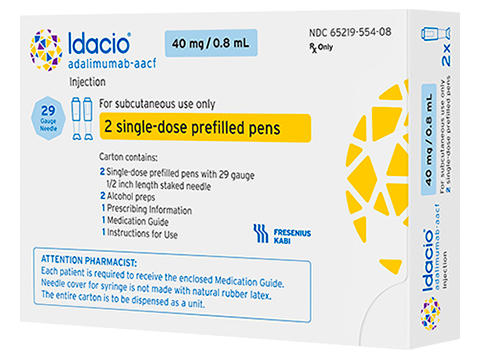KabiCare Patient Support Program forIDACIO® (adalimumab-aacf)
 IDACIO® (adalimumab-aacf) is an FDA-approved biosimilar to Humira® (adalimumab) that addresses patients’ and prescribers’ core needs.1
IDACIO® (adalimumab-aacf) is an FDA-approved biosimilar to Humira® (adalimumab) that addresses patients’ and prescribers’ core needs.1
First approved in 2019, and already available in nearly 40 countries around the world, IDACIO is indicated for:
- Moderate to severe rheumatoid arthritis in adults
- Moderate to severe polyarticular juvenile idiopathic arthritis in children age 2 years or older
- Psoriatic arthritis in adults
- Ankylosing spondylitis in adults
- Moderate to severe Crohn’s disease in adults and children 6 years of age or older
- Moderate to severe chronic plaque psoriasis in adults
- Moderate to severe ulcerative colitis in adults
- Moderate to severe hidradenitis suppurativa in adults
- Non-infectious intermediate, posterior, and panuveitis in adults
Learn More About Idacio (Opens in a New Window)
For more information about Biosimilars please visit our website: BioSpecialized (Opens in a New Window)
Reference 1: IDACIO (adalimumab-aacf) injection prescribing information. Lake Zurich, IL: Fresenius Kabi USA, LLC; 2023
Please see the Full Prescribing Information, including the boxed WARNING, for IDACIO (adalimumab-aacf) (PDF Opens in a New Window).
Please see the Full Prescribing Information, including the boxed WARNING, for ADALIMUMAB-AACF – This product is IDACIO® (adalimumab-aacf) (PDF Opens in a New Window).